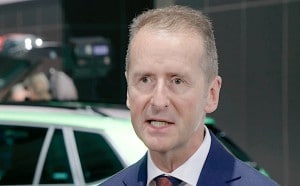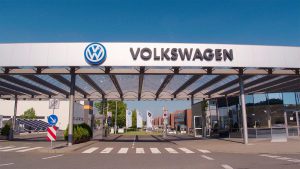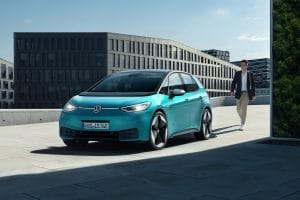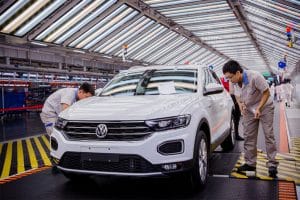
VW CEO Herbert Diess says this will be a tough year for the automaker, though there are signs the Chinese market is coming back to life.
(This story has been updated to reflect the announcement that Daimler also will close its European plants.)
Daimler AG on Tuesday evening in Europe announced it will temporarily close most of its European plants to address both the coronavirus pandemic and the consequent slump in new vehicle demand.
That move followed the announcement earlier in the day by Volkswagen CEO Herbert Diess that it will halt production at most of its own European plants for 14 days. The move by the two companies comes in response to the spreading coronavirus pandemic that is rapidly approaching 200,000 known cases and more than 7,000 deaths worldwide.
During a Tuesday morning news conference, Diess said the shutdown would begin “in the near future,” but the German news agency dpa quoted worker representatives indicating the closures would start this coming Friday in most locations. VW has already idled its plants in Italy, the European country hardest hit by the coronavirus crisis.
The escalating pandemic “presents us with unknown challenges,” said the VW CEO, adding that this could prove to be “a very difficult year.”
As for Daimler, it announced its own move in a brief news release stating, “”With these closures, Daimler is helping to protect its workforce, to interrupt chains of infection and to contain the spread of the pandemic. At the same time, this will help the company to prepare for a period of temporarily lower demand and to protect its financial strength.”
(Fever pitch: coronavirus taking increasing toll on auto industry.)
On a more positive note, Diess indicated during a meeting with reporters Tuesday that things are improving in China where the viral outbreak was first reported. Much of that country’s factories were closed, at least temporarily, while February auto sales plunged by 79% year-over-year, according to industry data.
“Sales are increasing and the showrooms are open,” the VW CEO said.

Among the plants being closed is one in Zwickau ramping up production of VW’s first long-range EV, the ID.4
After an initially slow response, Chinese authorities responded aggressive in late January, as Lunar New Year celebrations were getting underway. They initially focused on Wuhan, the city where the novel coronavirus was first believed to have infected humans. Within a short time, quarantines, shutdowns and other aggressive measures were put in place in much of China.
In recent days, authorities have claimed that factories in much of that country are getting back into operation. But how quickly is uncertain. Michael Dunne, founder of the Asian automotive consulting firm ZoZoGo, told TheDetroitBureau.com that many still have only a fraction of their workforce back, limiting how much they can produce – if they can operate at all. It also is unclear how quickly the Chinese auto market will recover.
Nonetheless, VW CEO Diess was optimistic, telling reporters, “China shows that this crisis can be managed if you are tough on the disciplinary measures and focused on re-launching the economy. I think it’s too early to judge how we’re going to end up in China, but if it can be contained in this first quarter and then we get back to normal again, then I think China is not yet lost for this year.”
VW officials need China to bounce back fast as it has become the industry giant’s largest market in terms of vehicle sales.
The Chinese market was already creating problems for the auto industry, as a whole, thanks to a rare downturn in sales last year. But Diess said “I am quite confident” about the market going forward.
(China claims its auto plants are ramping up production again, but there are plenty of skeptics.)
The question is what the coronavirus pandemic will mean for the company globally. As the year began, VW had expected an 4% increase in sales – even though worldwide new vehicle sales overall were widely expected to dip. Now, most key markets could suffer sharp declines, including the U.S. and Europe.
“The spread of coronavirus is currently impacting the global economy. It is uncertain how severely or for how long this will also affect the Volkswagen Group,” VW CFO Frank Witter said in a statement issued ahead of the annual news conference on Tuesday.

Diess said VW intends to hit its target, producing 100,000 of the ID.3 BEVs this year, despite the shutdown in Europe.
(Greenwich Concours canceled due to coronavirus pandemic.)
The planned shutdown in Europe is expected to last for just two weeks and is motivated not only to deal with the possible spread of Covid-19 among workers but due to a build-up of inventory on the Continent.
The shutdown of its European manufacturing operations comes at a particularly problematic time for VW. It is just in the midst of launching an ambitious electrification program, starting with the all-electric ID.3 hatchback being produced at a plant in Zwickau, Germany.
“We are standing by our electrification plan,” Diess said, noting the goal is still to produce 100,000 of the ID.3 models this year.
Zwickau was also set to ramp up a second model, the ID.4 later this year. That is to be the first long-range battery-electric vehicle VW will sell in the U.S. Plans call for the ID.4 to be imported from Germany until an $800 million expansion of the company’s Chattanooga, Tennessee plant is completed. At that point, the ID.4 will be built in the U.S.

